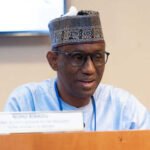More than half of the population in 34 out of 38 sub-Saharan African countries lack access to basic handwashing facilities, according to the Sanitation and Wastewater Atlas of Africa report.
The inaugural atlas report, a result of four years of collaboration, is a joint effort by the African Development Bank (AfDB), the United Nations Environment Programme (UNEP) and GRID-Arendal.
It assessed progress and highlighted opportunities where investment in sanitation and wastewater management can improve health and spur economic growth.
The publication incorporated maps, graphics and profiles of all African countries, including analyses of their water resources and provision of basic services.
A World Health Organisation (WHO) and United Nations International Children’s Emergency Fund (UNICEF) report noted nearly 750 million people, representing 69 percent of Africa‘s population, did not have access to basic sanitation services as at 2017.
That finding, according to the UN agencies, was a challenging baseline for achieving some of the sustainable development goals (SDGs) in Africa, where only a few of its 54 countries met the millennium development goals (MDGs) target for sanitation.
‘Africa cannot have a healthy society without adequate access to safe water, sanitation and hygiene’, AfDB’s Acting Vice President for Agriculture, Human and Social Development, Wambui Gichuri, said.
‘In the past ten years, the African Development Bank has invested more than $6 billion in sanitation and hygiene improvements, but much more financing is needed from the private sector, development finance institutions, governments and other sources.
‘The new Sanitation and Wastewater Atlas of Africa can inform strategic investment going forward’.
The report also noted that Covid-19 pandemic had sharpened an already existing need to upgrade Africa’s water and sanitation infrastructure.
It urged African governments to incorporate sanitation and wastewater programmes into their post-Covid-19 strategic planning.
‘As the world seeks to recover better after Covid-19, prioritising wastewater and sanitation infrastructure in Africa is critical’, authors of the report noted.
‘Sustainable development goal six, which calls for making water and sanitation available to everyone, is within reach by 2030 if we commit the needed resources’.
Also, the atlas report recommended investment in the necessary policies, infrastructure and human skills capacities to operationalise actions towards the achievement of goals and targets in the 2030 Agenda.
Source: AfDB
Photo source: Sanitation and Wastewater Atlas of Africa (2021)






